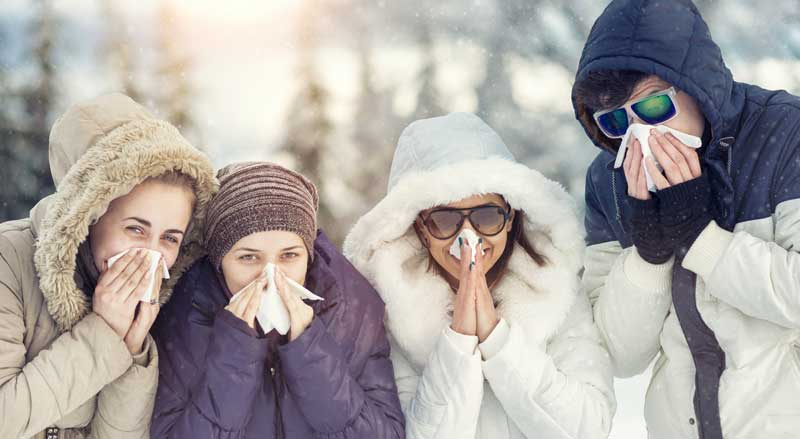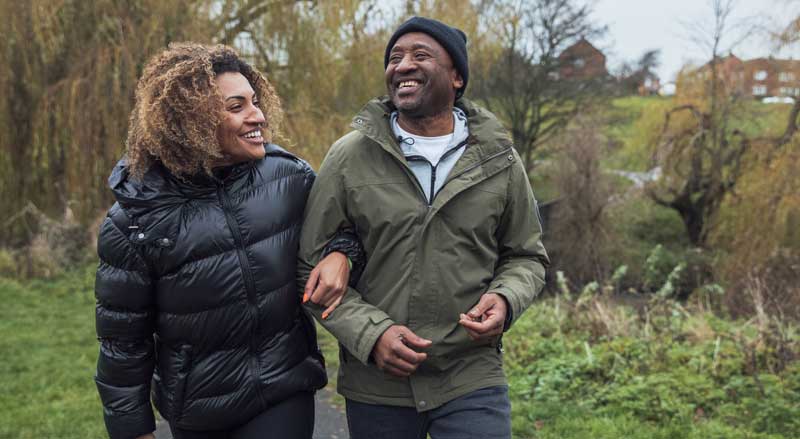It’s important to build your immune system to resist colds and flu. And it’s good to know, many of the steps we provide here offer additional benefits—including helping to prevent heart disease, type 2 diabetes, and even varicose veins!
The start of winter makes us think of exciting snow-covered ski slopes and heartwarming holiday gatherings. Unfortunately, winter is also the height of cold and flu season. But building your immune system and keeping it strong is important all year long.
How Our Immune Systems Help Us
Our immune systema help our bodies fight against harmful infections and diseases. It’s made up of a complex balance between our white blood cells, lymphatic system, thymus, and more!
Health care providers will recommend certain vaccines for protection against specific germs or invaders. But getting vaccinated is just part of protecting our health. There are many things one can do, daily, to keep our immune systems strong and our bodies healthy.
Immune Systems Weaken with Age
Immune systems change with age. And aging is certainly out of our control. Many older adults find their immune systems have weakened and they’re more susceptible to certain diseases.
But still there are things we can do at any age to make our immune systems stronger.
Here are ways to improve your immune system to better fight colds and flu. And you’ll find that the health benefits extend way beyond flu season.
Eat Healthy Foods
We enjoy foods because of their pleasing tastes and textures. But our bodies depend on food to get the necessary nutrients.
Not only does food give us energy (measured in calories) for activity and growth— it also keeps our immune system robust.
A healthy diet includes:
- Vegetables
- Fresh fruits
- Whole grains
- Fat-free or low-fat dairy products
- Lean protein
A diet filled with fresh fruits and vegetables will provide lots of fiber to support your gut’s microbiome production for a strong immune system.
You should avoid:
- Cholesterol
- Too much salt
- Sugar
- Saturated fats
Read how eating certain superfoods helps fight body inflammation and pain and helps prevent varicose veins and other health problems.
Vitamins and Supplements
Key micronutrients for strong immunity include:
- Vitamins A, B6, B12, C, D and E
- Zinc
- Selenium
- Copper
- Magnesium
Many doctors recommend taking zinc supplements if you’re developing a respiratory infection to ease symptoms and shorten the length of the infection.
A healthcare provider will let you know the best amounts of zinc and vitamins to take. You don’t want to take too much as some can be harmful if taken in too large a dose.
A balanced and complete diet may even eliminate the need for any additional supplements.
Stay Hydrated
A well-hydrated body will better fight off the flu and colds. Hydration can come from water, teas, and even chicken soup!
Adequate hydration helps the communication and biochemical pathways of the immune system. Your blood will more easily transport nutrients, fluids, and signals to organs to help fight infection.
Reduce Stress
Sometimes the thought of reducing stress seems a bit like herding cats—a highly difficult task. But even if you can’t control the events in your life, you can help your body better deal with the stress you’re experiencing. This is important because stress can harm you.
Stress weakens parts of your immune system and leaves you at greater risk of infection. For example, shingles, a painful and sometimes dangerous rash, often emerges when a person is under constant stress.
Some easy ways to reduce stress include:
- Going for a 20-minute walk
- Listening to favorite music
- Practicing yoga or meditation
- Reading a good book
- Calling a friend
- Doing something you enjoy—such as cooking a delicious meal for yourself
- Watching a funny movie
- Exercising
- Relaxing outside in the fresh air
- Spending time with your pet
Exercise
Start exercising to give your immune system a boost. Exercise helps the immune cells circulate throughout your body during the periods of exercising. Afterwards, the immune cells will remain for up to three hours, working to protect your body from harm.
Harvard Medical School published the benefits of brisk walking to boost immune function during the cold and flu season. It reported, “A study of over 1,000 men and women found that those who walked at least 20 minutes a day, at least 5 days a week, had 43% fewer sick days than those who exercised once a week or less. And if they did get sick, it was for a shorter duration, and their symptoms were milder.”
Exercise will also support vein health so veins can efficiently help your immune system circulate throughout your body.
Watch Your Weight
Keep at a healthy weight for a strong immune system and optimal health.
Health professionals define an obese person as someone with a body mass index (BMI) higher than 30. Studies have shown that obesity can decrease the immune system’s effectiveness and is associated with a lower effectiveness of vaccines—including the flu vaccine.
Other studies have found a connection between being underweight and having an impaired immune system.
When it comes to your immune system and your health in general, it’s best to maintain a good weight. Your health care professional can give you the best weight range to strive for.
These factors play a role in weight management:
- Eating a well-balanced and healthy diet
- Getting enough sleep
- Exercising
- Minimizing stress
Get Plenty of Sleep
It’s an undisputed fact that experiencing a poor quality of sleep hurts your immune system.
Not getting enough sleep will:
- Dangerously reduce production of cytokines (small proteins that enhance activity of immune system cells and blood cells)
- Reduce production of antibodies
- Increase your risk of viral infections
Read more about the effect of sleep on your veins and arteries.
Give Your Lifestyle a Checkup
Two of the most important things you can do to preserve your immune system are:
- Stop smoking
- Limit alcohol
Smoking will make you more susceptible to getting influenza and pneumonia, as well as making these illnesses more severe and long-lasting.
Excessive use of alcohol will reduce the antibodies your body has to fight off infections. It also disrupts gut barrier function that produces antiviral proteins and eliminates infections.
Are you wondering about your vein health? Contact us at NJVVC to request a free vascular screening.






